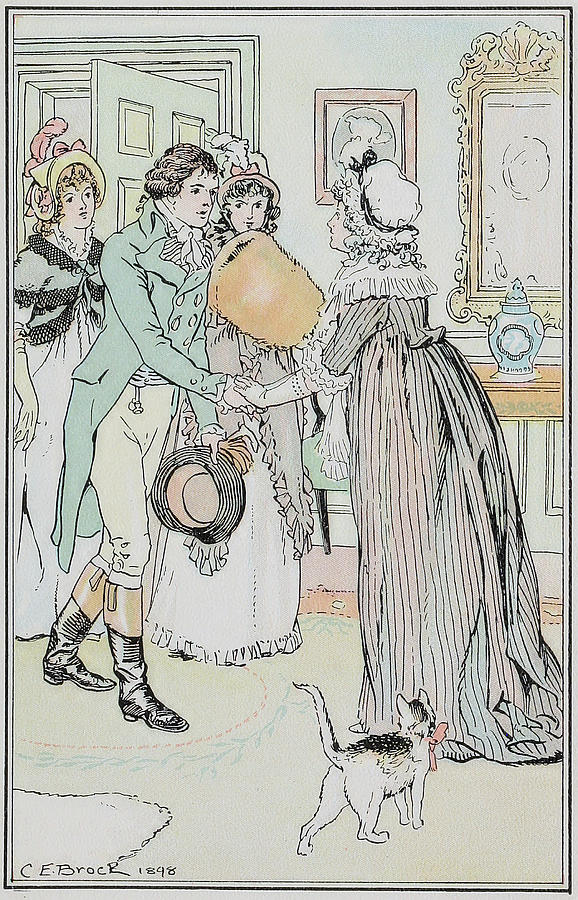Sense & Sensibility, chapter 17: The Three Faces Of Edward
Here’s the thing about Edward: even if you know what’s really going on with him, that doesn’t necessarily make him less frustrating. More sympathetic, maybe. But still a tough nut to crack, and not an ideal romantic lead. We don’t get to see his inner world (unlike his unofficial female counterpart), which is why chapters like this one are so important.
Although Edward warms up to the Dashwood girls eventually, he is “not in spirits.” Mama Dashwood offers her sympathy and he opens up about his lack of ambition, a core aspect of his character that his mother and perhaps some readers dislike. He merely wants to be happy on his own terms, which don’t include chasing after “greatness” or becoming rich. He acknowledges his true faults, referring to himself as “foolishly shy” and “so little at my ease among strangers of gentility.”* Or, to put it another way, he has trouble recommending himself to strangers …
Okay, I didn’t have that on my Jane Austen bingo card.
Funnily enough, though we’ve seen a couple of Edward’s awkward moments (one arrives at the end of the chapter), he has little issue articulating his troubles to the Dashwoods. And though this definitely doesn’t make his character exciting, it does differentiate him from Willoughby, who—for all the happiness he’s brought into their lives—has never opened up about his hopes and fears. Edward displays his vulnerability in a way that most male characters are denied. In fact, when you think about it, Edward’s struggles are similar to those of female characters in this book and others. He clashes with his family’s expectations for him. His formal education is lacking (he says later that he began Oxford a year later because his mother did not enroll him sooner). He doesn’t have control over his finances.
Money in particular is a touchy subject for them all, as Elinor and Marianne disagree on what value constitutes “wealth” instead of a “competence.” Marianne thinks 2,000 pounds is “moderate,” but it’s obvious she has Combe Magna in her thoughts. The practical Elinor acknowledges that a “fortune” is in the eye of the beholder, as she imagines that her mother would find plenty of ways to spend a large sum to fix up the house.
Edward, in his warmest speech so far, imagines “[w]hat a happy day for booksellers, music-sellers, and print-shops” it would be if the Dashwood sisters came into money. I don’t know if it’s his intention to steer the subject away from finance talk, but in any case he succeeds, as well as show his willingness to gently kid Marianne about her romantic notions. They both agree that neither of them are “lively” (the next chapter will reveal another affinity between the two).
Edward considers his struggle to express “general civility” similar to Marianne’s, although—as Elinor points out—Marianne objects to it on principle. Feeling sassy (hey, it’s better than her usual moodiness), Marianne claims that Elinor’s “doctrine” dictates that “our judgments were given us merely to be subservient to those of our neighbors.” First of all: unfair. Second of all, Elinor already mentioned how she’s observed that “[s]ometimes one is guided by what [a person says] of themselves, and very frequently by what other people say of them, without giving oneself time to deliberate and judge.” We’ve already seen her exercise this philosophy to her sister’s suitor. Later, we will see how her judgments about other characters play out—and it’s not quite as clear-cut as you might think. In any case, it’s telling that she also feels safe to admit her shortcomings in front of Edward. There is a symmetry of personality going on here that links the two—again, not in an exciting or flashy way, which makes it easy to skip over.
And it raises an important question of whether Elinor has made a mistake “in a total misapprehension of character” when it comes to Edward’s regard. Has she misread his intentions? Is she listening too much to her own heart, rather than to what Edward says about himself? Of course, it would help if he talked more: when Marianne accuses him of being too “reserved,” it hits him so hard that “[h]is gravity and thoughtfulness [return] on him in their fullest extent.” I guess Elinor’s philosophy doesn’t account for the notion that sometimes people prefer to hide their true “character.”
Next week, Edward cheers up and Marianne discovers that someone put a ring on it.
*David M. Shapard compares Edward to the lead male character of She Stoops To Conquer, a fun and funny play from 1773 that has a lesson about treating women with kindness and humility regardless of their rank or position.



Comments
Post a Comment